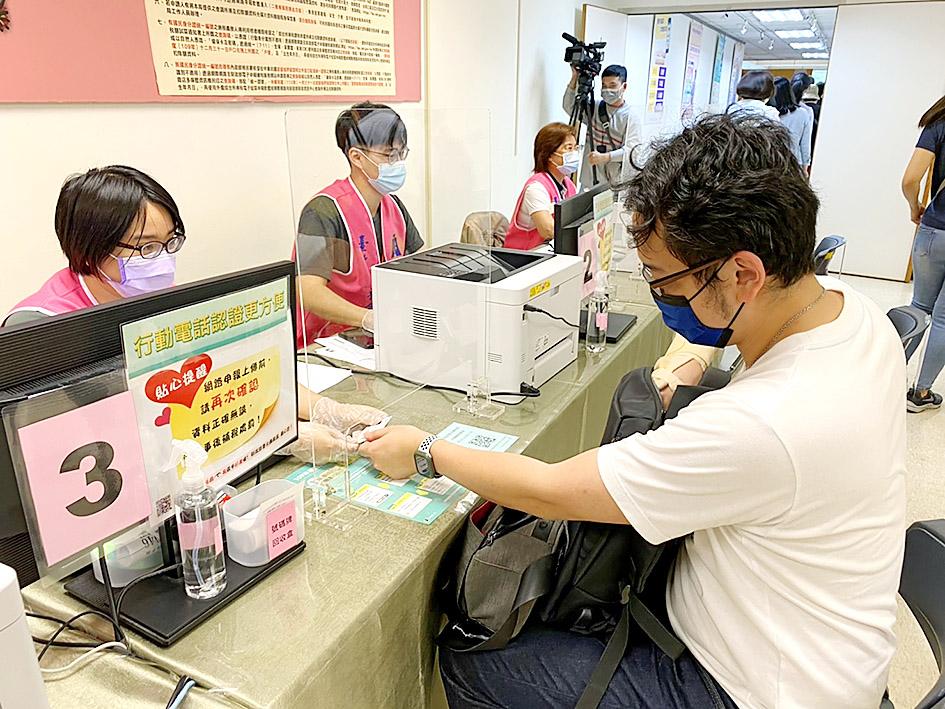The national treasury last month collected NT$293.2 billion (US$10.58 billion) in tax revenue, an increase of 28.5 percent from a year earlier, as all tax categories posted strong gains on the back of economic improvement, the Ministry of Finance said yesterday.
Corporate income tax revenue soared 52.3 percent to NT$21.6 billion, while personal income tax revenue increased 17.8 percent to NT$29.4 billion, the ministry’s monthly report showed.
The gains were due to companies and individuals filing income taxes before a moratorium amid a COVID-19 outbreak was introduced last month, Department of Statistics Deputy Director-General Chen Yu-feng (陳玉豐) told an online news conference in Taipei.

Photo: Allen Wu, Taipei Times
The ministry extended the deadline for tax filing from Monday last week to June 30, after health authorities on May 14 raised the nationwide COVID-19 alert to level 3 and urged people to stay home.
The ministry introduced the same respite last year to give companies and individuals affected by the health crisis more time to tackle the financial burden, Chen said, adding that the comparison base was therefore relatively low.
Local firms in a variety of sectors posted profit growth this year, thanks to inventory-building demand propelled by expectations that the world is to emerge from the COVID-19 pandemic later this year.
Business tax revenue increased 19 percent to NT$85.5 billion, while sales tax revenue jumped 36 percent to NT$17 billion, the ministry said.
The government’s business climate monitor has flashed “red” for the past three months, reflecting a boom in Taiwan’s export-focused economy.
Securities transaction tax revenue grew more than twofold to NT$29.4 billion as daily turnover spiked to a record NT$578.1 billion, Chen said.
Day trading in the past few weeks contributed more than 30 percent, Taiwan Stock Exchange data showed.
Land increment tax revenue increased 25.3 percent to NT$10.9 billion, as the number of taxable cases rose 32.3 percent to 64,525, Chen said.
The robust showing suggested active trading, she said, refuting speculation that the trend was linked to an increase in selling pressures due to upcoming property tax increases.
Starting next month, houses — including presale contracts — resold within five years of purchase are subject to taxes of 35 to 45 percent, in line with the government’s effort to curb short-term property speculation.
Housing transactions picked up in New Taipei City, Taoyuan, Hsinchu, Tainan and Kaohsiung, Chen said, citing government data.
For the first five months of this year, tax revenues totaled NT$893.2 billion, a 19.4 percent increase from the same period last year and ahead of the budget schedule by 13.1 percent, the ministry said.

CHIP RACE: Three years of overbroad export controls drove foreign competitors to pursue their own AI chips, and ‘cost US taxpayers billions of dollars,’ Nvidia said China has figured out the US strategy for allowing it to buy Nvidia Corp’s H200s and is rejecting the artificial intelligence (AI) chip in favor of domestically developed semiconductors, White House AI adviser David Sacks said, citing news reports. US President Donald Trump on Monday said that he would allow shipments of Nvidia’s H200 chips to China, part of an administration effort backed by Sacks to challenge Chinese tech champions such as Huawei Technologies Co (華為) by bringing US competition to their home market. On Friday, Sacks signaled that he was uncertain about whether that approach would work. “They’re rejecting our chips,” Sacks

It is challenging to build infrastructure in much of Europe. Constrained budgets and polarized politics tend to undermine long-term projects, forcing officials to react to emergencies rather than plan for the future. Not in Austria. Today, the country is to officially open its Koralmbahn tunnel, the 5.9 billion euro (US$6.9 billion) centerpiece of a groundbreaking new railway that will eventually run from Poland’s Baltic coast to the Adriatic Sea, transforming travel within Austria and positioning the Alpine nation at the forefront of logistics in Europe. “It is Austria’s biggest socio-economic experiment in over a century,” said Eric Kirschner, an economist at Graz-based Joanneum

BUBBLE? Only a handful of companies are seeing rapid revenue growth and higher valuations, and it is not enough to call the AI trend a transformation, an analyst said Artificial intelligence (AI) is entering a more challenging phase next year as companies move beyond experimentation and begin demanding clear financial returns from a technology that has delivered big gains to only a small group of early adopters, PricewaterhouseCoopers (PwC) Taiwan said yesterday. Most organizations have been able to justify AI investments through cost recovery or modest efficiency gains, but few have achieved meaningful revenue growth or long-term competitive advantage, the consultancy said in its 2026 AI Business Predictions report. This growing performance gap is forcing executives to reconsider how AI is deployed across their organizations, it said. “Many companies

France is developing domestic production of electric vehicle (EV) batteries with an eye on industrial independence, but Asian experts are proving key in launching operations. In the Verkor factory outside the northern city of Dunkirk, which was inaugurated on Thursday, foreign specialists, notably from South Korea and Malaysia, are training the local staff. Verkor is the third battery gigafactory to open in northern France in a region that has become known as “Battery Valley.” At the Automotive Energy Supply Corp (AESC) factory near the city of Douai, where production has been under way for several months, Chinese engineers and technicians supervise French recruits. “They